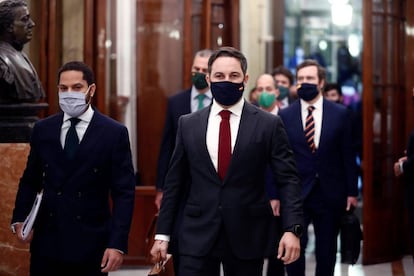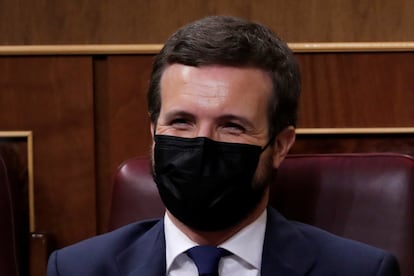Vox’s motion of no confidence against the government: what you need to know about the two-day debate
The far-right party’s leader, Santiago Abascal, is running as a candidate to replace Socialist Party Prime Minister Pedro Sánchez, but the bid is almost certainly doomed to fail due to lack of support from other groups

No one knows how far the coronavirus pandemic will spread, and equally no one knows just how high the political tension will rise in Spain. With talk this week of a possible curfew in a bid to curb infection rates, today will see the Congress of Deputies immersed in its everyday battles, albeit dressed up with the solemnity of an extraordinary debate: a motion of no confidence tabled against the prime minister, the fifth in Spain’s democratic history.
After months of fomenting protests and animosity in the streets, far-right party Vox – currently the third-biggest group in Spain’s lower house of parliament – this morning began a debate that will last two days, and will see its deputies take to the podium to proclaim that the group is an alternative to the current government, a coalition of the Socialist Party (PSOE) and junior partner Unidas Podemos. Vox and its leader, Santiago Abascal, are viewing their motion of no confidence as a springboard, but the effects could be contradictory: the vote, which is almost certainly guaranteed to fail due to a lack of support among deputies, is likely to divide the opposition and push the government and its partners – the coalition lacks a working majority in Congress – to put aside their differences.
The only thing that they are going to achieve is to increase the political conflict and see the government emerge stronger and more unitedCiudadanos spokesperson Edmundo Bal
The motion of no confidence has put the main opposition Popular Party (PP) in the most difficult position. Tuesday was not an easy day for party spokesperson Cuca Gamarra, given that the conservative group’s leader, Pablo Casado, is still yet to announce how the PP will vote at the end of the two-day debate. Questioned on this yesterday, Gamarra said he only wanted to talk about “what interests Spaniards;” i.e. new laws to deal with the pandemic, the ongoing attempts to unblock the renewal of the CGPJ legal watchdog, the refusal of a Podemos leader to testify in the Supreme Court… Gamarra insisted on discussing these issues, despite reporters’ insistence on asking her how the PP would vote on the motion, and whether it would support Abascal’s candidacy to become prime minister, ousting Pedro Sánchez of the PSOE.
The PP spokesperson would not even confirm whether her parliamentary group would be meeting in order to reach an agreement on the vote. Early on Tuesday morning, after Gamarra had been interviewed on state broadcaster TVE, everyone took for granted that PP leader Pablo Casado would be the spokesperson in the debate. But by midday even that was unclear. “In politics, nothing is definitive,” she stated. And if there were any room for doubt, she added: “What is going to happen in the coming hours will be dictated by the coming hours.”
The discomfort caused by Vox in the PP is clear for all to see. Over the last two years, Abascal has managed to devour a good part of the party’s traditional voters, and there is a lack of agreement among the group’s leaders as to how best to combat this: should the PP focus on its differences with the far-right group or appeal to the voters it has lost to it? In recent days the PP has opted to ignore the issue, with Casado going so far as to say that the motion of no confidence “holds absolutely no importance for us.” The only thing that this achieved was turning the secrecy and the indecision of the party into a major issue just ahead of a motion of no confidence that is unlikely to secure a single vote of support apart from among the 52 deputies that Vox counts on in the 350-seat chamber.

As a result, while the PP tried to focus on “what interests Spaniards,” Spain’s political talk shows discussed nothing else but the debate. During one such broadcast, Vox spokesperson Iván Espinosa de los Monteros said that “the PP led the opposition in the past. Now it is a contemplative party. It reminds me of the cows that moo while looking out at the Cantabrian Sea.”
Ahead of the debate, it appeared difficult for the right-wing parties not to emerge more divided than ever, far from the photo opportunity when the leaders of the PP, Vox and center-right Ciudadanos (Citizens) posed together after an anti-government protest in Madrid’s Colón square. For some time now, and under new leadership, Ciudadanos has moved away from the other two parties and there are no doubts that its deputies will vote no tomorrow. “The only thing that they [Vox] are going to achieve is to increase the political conflict and see the government emerge stronger and more united,” said party spokesperson Edmundo Bal.
The motion of no confidence has put the main Popular Party in the most difficult position and it has still not announced how it will vote
The executive will be working to consolidate that sensation. Faced with Vox leader Santiago Abascal, who will be railing against the “social-communists” – the phrase appears 23 times in the 28 pages of his motion – the government has decided to embrace the fact that it is a coalition. The executive can intervene in the debate at any time, and both the prime minister and Pablo Iglesias, the leader of Unidas Podemos and one of Spain’s deputy prime ministers, are planning to do so.
The promoters of the motion of no confidence have done little to disguise its fundamentally propagandistic nature. The chance to speak in Congress in full view of the media, without time limits, is a unique opportunity, they have stated over and over. The intention is not that different from that which prompted Pablo Iglesias to file a motion of no confidence against then-PP Prime Minister Mariano Rajoy in 2017: presenting your party as the true opposition at the cost of your closest rival. For Iglesias, it was the PSOE; for Vox, the PP.
With this maneuver, Abascal will have to pass the test of presenting a comprehensive governing program, something that has been lacking on the part of Vox up until now. The party leader is not known for his policies, having freely admitted until as recently as last year that he is not interested in “urban planning or school timetables,” but rather “honor, patriotism and things like that.” But during the debate today and tomorrow, he “will talk about different things,” according to Espinosa de los Monteros, who promised the discourse would be “groundbreaking and surprising.”
What is unlikely to be groundbreaking and surprising is the tense atmosphere that is once again likely to be on display in Congress. Party spokespersons have resigned themselves to the fact that agitation between the groups will be inevitable. “We’ll see things that we’ve never seen in Spanish parliament,” said Gabriel Rufián, a deputy from the Republican Left of Catalonia, who is himself no stranger to controversy. “And that’s saying something…”
English version by Simon Hunter.
Tu suscripción se está usando en otro dispositivo
¿Quieres añadir otro usuario a tu suscripción?
Si continúas leyendo en este dispositivo, no se podrá leer en el otro.
FlechaTu suscripción se está usando en otro dispositivo y solo puedes acceder a EL PAÍS desde un dispositivo a la vez.
Si quieres compartir tu cuenta, cambia tu suscripción a la modalidad Premium, así podrás añadir otro usuario. Cada uno accederá con su propia cuenta de email, lo que os permitirá personalizar vuestra experiencia en EL PAÍS.
¿Tienes una suscripción de empresa? Accede aquí para contratar más cuentas.
En el caso de no saber quién está usando tu cuenta, te recomendamos cambiar tu contraseña aquí.
Si decides continuar compartiendo tu cuenta, este mensaje se mostrará en tu dispositivo y en el de la otra persona que está usando tu cuenta de forma indefinida, afectando a tu experiencia de lectura. Puedes consultar aquí los términos y condiciones de la suscripción digital.









































